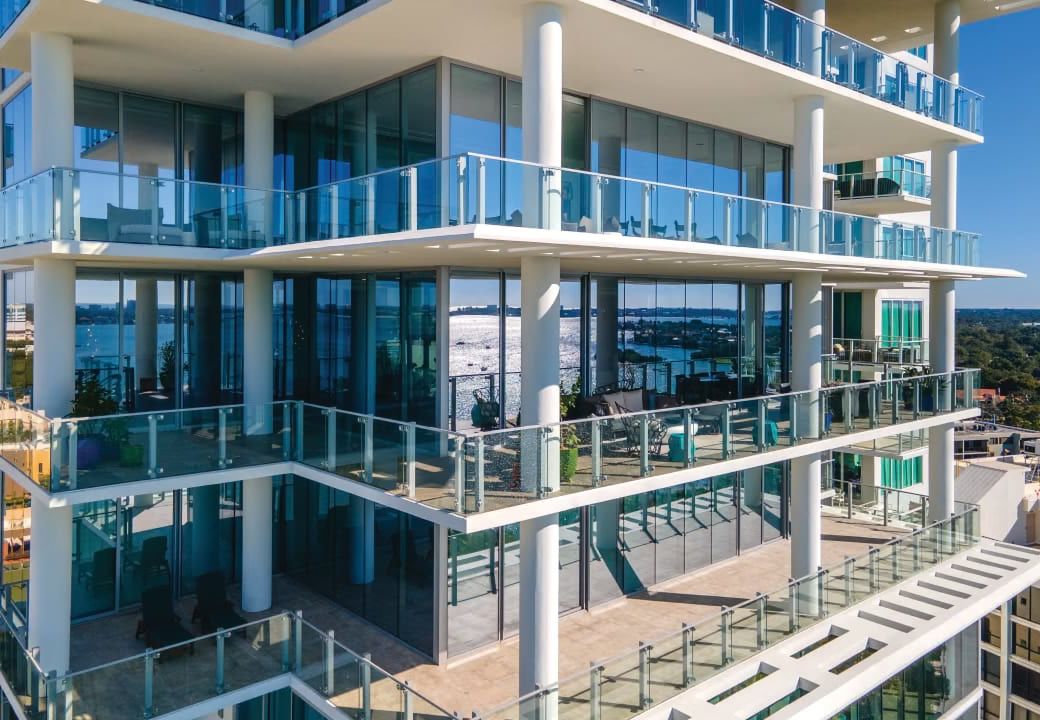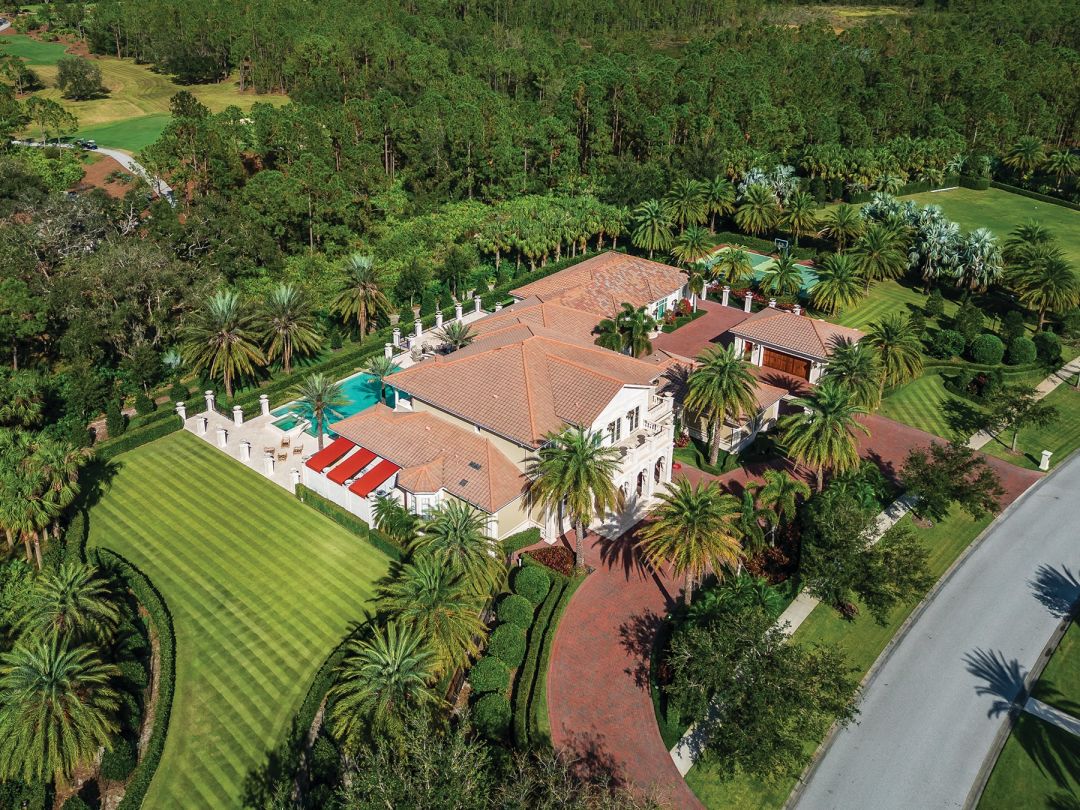
How Wealthy Do You Have to Be to Live in Sarasota?
Wealth is like water—seeking the easiest path, flowing into new places and reshaping landscapes for good and bad. In Sarasota, long a vacation and second (and third) home destination for the wealthy, the flow of money and prosperity has accelerated in the last decade, bringing to town more millionaires, multimillionaires and even billionaires, plus their affluent lifestyles and interests.
Perhaps nothing symbolized our arrival in this rarified world of the high-net-worth customer—someone with at least $1 million in liquid assets—more than the opening of The St. Regis Longboat Key Resort and Residences in August 2024. St. Regis hotels offer ultra-luxe accommodations and amenities in locations such as Bora Bora, Aspen and Singapore. A single night in a St. Regis suite can cost upwards of $15,000. At the Longboat Key location by the beachfront, guests can take a “snow shower” in the 20,000-square-foot spa and order a $400 cocktail at one of its restaurants. And despite an area-wide slump in the condo market, a two-unit condo there sold in November 2024 for more than $21 million, the area’s highest residential sale ever.
The opulence was a signal to the global world of wealth: Our area has become a destination for the well-heeled, even when they’re wearing flip-flops on the beach.
“The St. Regis brought in its loyalists—people who weren’t even looking here before,” says Lisa Rooks Morris of Douglas Elliman, a real estate company specializing in luxury properties.
A luxury hotel may symbolize Sarasota’s affluence, but it’s hardly the source of it. Florida’s appeal lies elsewhere: no state income tax, no estate or inheritance taxes, and a regulatory climate designed to keep government interference minimal. Add in the obligatory sunshine and postcard-worthy coastline, and the state becomes an almost engineered haven for those intent on preserving capital. “Wealth migration is part of the state’s DNA,” says Sean Snaith, director of the University of Central Florida’s Institute for Economic Forecasting.
Sarasota, once a sleepy Gulf Coast town, is now thick with transplants—many of them powerhouse CEOs and entrepreneurs—who have graduated well past the threshold of high-net-worth into the ultra-high-net-worth stratum: $30 million and up. For many, that’s just the starting point.
There’s billionaire Kenneth Feld of Feld Entertainment, which owns Disney on Ice and Monster Jam; Rep. Vern Buchanan, who owns multiple car dealerships and insurance companies and is the third-wealthiest member of Congress, with an estimated net worth of approximately $150 million; author Stephen King, who’s ranked as one of the richest writers in the world; Randy Benderson of Benderson Development, the scion of the founder of the largest commercial development company in Florida, with projects around the country; former Proctor & Gamble CEO A.G. Lafley, the key player in the development of The Bay, a public-private, 53-acre waterfront park in downtown Sarasota; Brian Cornell, CEO of Target Corporation, also a billionaire; and Julie Fancelli, heiress to the Publix supermarkets fortune and a member of one of the nation’s richest families, with an estimated net worth of $11.2 billion.

Image: Denis Lauzon
The numbers don’t just suggest an influx of wealth—they confirm it. In 2014, the North Port-Sarasota-Bradenton Metropolitan Statistical Area or MSA tallied 17,005 millionaire households, or 5.3 percent of area households, according to Phoenix Marketing International, a market research and marketing analytics firm that tracks affluence trends. These are households with at least $1 million in investable assets, not counting real estate or retirement accounts, such as 401(k)s. In 2014, when Sarasota Magazine reported on this group, it was estimated that 2,450 of these households had assets of $5 million or more.
According to IRS data analyzed by the Tax Foundation, Sarasota County gained more than $2.6 billion in net adjusted gross income from migrating households between 2021 and 2022, ranking it third among all Florida counties in total wealth inflow.
More recently, in an analysis of 2023 U.S. Census Bureau data, the North Port-Sarasota-Bradenton metro ranked fourth nationwide for net growth in high-income residents—defined as those earning $150,000 or more. The region experienced a 68 percent increase in this income group’s population during 2023, making it one of only two Florida metros to rank in the top 10 for affluent migration.
The pandemic only sharpened Florida’s appeal to the affluent. High-income households, particularly from lockdown-heavy states like New York, Illinois and California, began decamping to the Sunshine State after Gov. Ron DeSantis declared Florida open for business. Mask mandates were loosely enforced, and Covid restrictions were among the first in the country to be lifted. By May 2020, bars and restaurants were already ushering in the pandemic-weary just two months after it took hold in the U.S.
Many of the newer, high-profile multimillionaires who arrived here after the pandemic are also current or former CEOs. H. Lee Scott Jr., former CEO of Walmart Inc., paid $11.25 million in June 2023 for a waterfront home on Bird Key. That same summer, Maureen Kelly, founder and CEO of Tarte Cosmetics, bought a $9.45 million Longboat Key property. In 2024, Neil Hunn, CEO of Sarasota-based Roper Technologies, was linked via an LLC to the $12,995,000 purchase of a unit at the St. Regis Residences. Billionaire Todd Wanek, CEO of Ashley Furniture, is connected to an LLC that purchased the Ohana home, also on Longboat Key, for $19.75 million cash. Rolling Stones frontman Mick Jagger even had a short stint living in Lakewood Ranch, but sold his home there in a $3.25 million cash deal in 2023.

Image: Ryan Gamma
This more permanent affluent population continues to reshape Sarasota. Civic improvements now stretch from sculpted parks and performance halls to a growing constellation of public art, all set against freshly landscaped waterfronts and softened streetscapes. Beyond the traditional strongholds of beachfront wealth, gleaming new, upscale neighborhoods, such as Wellen Park, Skye Ranch and Waterside have emerged inland. Downtown, new luxury condo towers sparkle with glass and ambition. The scale of investment is no longer merely impressive—it’s disorienting. In 2015, there were 164 residential purchases in Sarasota and Manatee counties priced at $2 million or more. In 2024, that number grew more than 4.5 times, to 753, even popping up in once-humble neighborhoods dotted with wood-frame cottages, like Gillespie Park and Paver Park.
And these days, $2 million can sometimes look like pocket change. Since 2020, local real estate transactions have shattered records with regularity. There was the $19.75 million Ohana sale in 2024; two years earlier, a Harbor Acres property changed hands for $17.5 million. In 2020 and 2021, homes fetching $16.5 million each reset market expectations. Many of these deals closed in cash. By 2023, the 10 most expensive local homes ranged in value from $18 million to $23 million. Now, sales in the $30 million range are entering the market. The most recent: La Serenissima, a bayfront estate on Longboat Key, which sold for a record $30.3 million cash in August 2025. And while these prices might still pale beside Naples’ market, which notched a $225 million sale in 2024, they mark a new chapter here.
“Ten years ago, a $10 million home in Sarasota was almost unheard of,” says Morris. “Now it doesn't surprise me as much. A few years ago, I sold a resale condo at Epoch [in downtown Sarasota] for $11 million. That just didn’t happen here before. You’ve got to be really wealthy to think $20 million is cheap, but that’s how wealthy buyers shopping for a home are thinking.”

Image: Courtesy Photo
The arrival of brands like the St. Regis and The Ritz-Carlton Residences signaled a shift; next comes Rosewood Residences on Lido Beach, an ultra-luxury global name making a rare move—its first U.S. residential-only project, untethered from a hotel, with prices starting at $6.5 million. The brokerage landscape has followed suit. Compass Real Estate and Douglas Elliman, both from New York’s high-end market, planted Sarasota flags in 2021 and 2023, respectively. And gossip in real estate circles suggests the legendary Waldorf Astoria—long synonymous with old-world grandeur—may be setting its sights on downtown Sarasota.
“The market is responding with more luxury buildings, more spec homes,” Morris says. “Ten years ago, a buyer from New York couldn’t find the level of quality they wanted. Now we’re there.”
There’s also a growing roster of invitation-only, high-investment clubs redrawing the boundaries of exclusivity. The Ritz-Carlton Members Club in Lakewood Ranch offers several tiers, including a Platinum membership with a $50,000 initiation fee and annual dues of approximately $10,800, granting access to the Ritz’s golf, spa, beach club and fitness facilities. A similar model is expected at 1000 North on Boulevard of the Arts. While pricing for the Sarasota location hasn’t been officially released, the original club in Jupiter charges $5,000 to join and another $5,000 per year for access to its private dining and social spaces. On Longboat Key, the well-established Longboat Key Club requires initiation fees between $120,000 and $175,000, with annual dues ranging from $13,000 to $17,500. In return, members have access to resort-caliber perks like world-class golf courses and tennis courts, spa and wellness services, a full-service marina, fine dining options and bespoke concierge services.
And in 2022, Tiger 21—a private peer group for ultra-high-net-worth individuals—arrived. To join, members must have at least $20 million in investable assets. Within six months, the Sarasota chapter filled its first dozen-member group, prompting the launch of a second to meet continuing demand. Members range from retired entrepreneurs to investors in fields like real estate, manufacturing, tech and healthcare. Social events—boating, pickleball and golf—are standard fare. But the core of Tiger 21 is less about leisure than legacy. Monthly meetings dive into estate planning, succession strategy, philanthropy and financial wellness, offering a forum where wealth isn't flaunted—it’s dissected.
“A major pull to Sarasota has been the ease of doing business in Florida, with growing investment opportunities. Many members are moving from larger cities and appreciate the privacy and community engagement,” says Wendi Chapman, chair of Tiger 21’s Sarasota chapter. “The large majority have their primary residences here now. What may have historically been considered a vacation or seasonal destination is now viewed as home base.”

Image: Courtesy Photo
Economist Snaith says this new gold rush is a self-perpetuating cycle. “Once you get a cluster of migrants with similar characteristics, it builds on itself,” he says. “Sarasota’s proximity to the Gulf and its lifestyle are a draw. The salaries aren’t what bring people here. It’s who can afford to live here today due to the cost of housing. Most working people don’t move to that kind of place.”
As more affluent individuals arrive with family offices (their own private wealth management firms handling their family’s affairs) and complex portfolios, financial institutions are evolving, too. As of Dec. 31, 2024, Northern Trust now manages $7.25 billion in assets locally, up from $6.73 billion in 2023, a 7.7 percent increase in just one year. According to a 2022 study by the Florida Philanthropic Network, an estimated $55 billion in wealth is expected to transfer from one generation to the next across Sarasota, Manatee, Charlotte and DeSoto counties over the next decade.
“Sarasota’s wealth scene has exploded. Young entrepreneurs, C-suite execs—they’re not just retiring here,” says Paul Hudson, Northern Trust’s senior vice president and managing director. “They’re building businesses, staying year-round, getting involved. We’ve expanded our advisory team and added services in estate strategy and multigenerational giving. There’s a level of sophistication expected now that mirrors what you’d find in a much larger market.”
Projects like The Bay—a $200 million redevelopment of Sarasota’s 53-acre downtown bayfront, led by Lafley, the former Proctor & Gamble CEO who relocated here in 2016—along with the proposed $400 million Sarasota Performing Arts Center, are cementing the region’s reputation as a philanthropic and cultural hub. These aren’t routine capital campaigns; they’re feats of civic ambition requiring hundreds of millions in charitable gifts. Mote Marine Laboratory has pulled in approximately $132 million for its new Science Education Aquarium, while Selby Gardens has secured more than $115 million for its sweeping expansion. And in a gesture that turned heads, an anonymous $60 million gift to the Sarasota Orchestra’s planned Music Center this year became one of the largest single donations ever made to an American orchestra. (Read more about it here.)

Image: Hannah Trombly
The paradox of Sarasota’s wealth is that, for all its abundance, many households and systems are under strain. United Way Suncoast reports that nearly 42 percent of Sarasota County households fall into the ALICE category, which stands for “Asset Limited, Income Constrained, Employed.” In the most recent ALICE report, released this year, a family of four in Sarasota County needs a budget of more than $100,000 to survive. Approximately 50 percent of local public school students qualify for free or reduced lunch. Hundreds of children are on waiting lists for subsidized care for important services such as preschool. Hospitals report staffing shortages. Public transit lags behind population growth. For decades, the affordable housing inventory has failed to keep pace with demand.
According to the Realtor Association of Sarasota and Manatee, the median sale price for a single-family home in Sarasota County rose from $290,000 in April 2019 to $470,000 in April 2025—an increase of 62 percent over six years. That translates to an average annual growth rate of about 8.4 percent, significantly higher than the historical U.S. norm of 3 percent to 5 percent per year, based on long-term housing data from sources such as the Federal Housing Finance Agency. The outsized price gains reflect Sarasota’s transformation during the pandemic and post-pandemic years.
Says economist Snaith, “If Sarasota doesn’t build the systems to match the demand for transportation, housing, education and health services, you’ll see pressure points become breaking points.”
But, he adds, wealth is an asset to a community. “There are places around the country that would love to have your problem,” he says. “Sarasota is still Sarasota, and the things that have drawn more affluent migrants remain in place.”